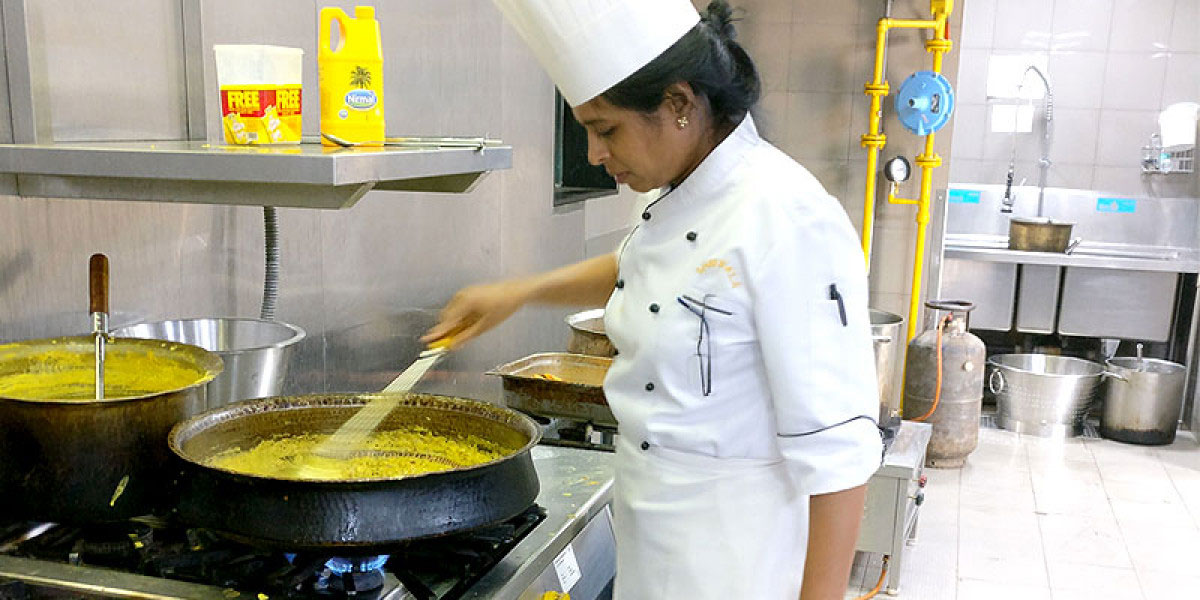Challenges make you strong, says Shri Bala
Chef, chartered accountant, food history researcher, blogger and author — Shri Bala wears several hats. Her journey as a chef has seen her cook delicious food for happy diners, juggle challenges, and learn a lot along the way. Shri Bala shares the secret of her success with Vikhroli Cucina and also has some tips for aspiring home chefs
 2016 was an eventful year for Shri Bala. Life took a 180 degree turn for this chartered accountant-author -blogger when she took over the kitchen at the Trident Bandra Kurla Complex. Shri Bala helmed the Dakshin Rivaayat, which was part of the Rivaayat series at the Trident that offers diners authentic Indian food. The week-long festival offered traditional, home-style south Indian food and was well received by guests. “My first ever event at the Trident BKC Mumbai was my baby step into this culinary world. It will always be cherished. I became a guest chef because of Ashish Bhasin. He is my chef guru,” says Shri Bala.
2016 was an eventful year for Shri Bala. Life took a 180 degree turn for this chartered accountant-author -blogger when she took over the kitchen at the Trident Bandra Kurla Complex. Shri Bala helmed the Dakshin Rivaayat, which was part of the Rivaayat series at the Trident that offers diners authentic Indian food. The week-long festival offered traditional, home-style south Indian food and was well received by guests. “My first ever event at the Trident BKC Mumbai was my baby step into this culinary world. It will always be cherished. I became a guest chef because of Ashish Bhasin. He is my chef guru,” says Shri Bala.
That was her first foray into the world of cooking in an industrial kitchen and it’s safe to say she hasn’t looked back since then. Shri Bala has successfully conducted several food pop ups and cooked at events such as Home Chef Matters 2.0 – Lost Recipes. For Home Chef Matters 2.0, she decided to serve two dishes from ancient Tamil kitchens. “I made Kootansoru – a one pot meal – with country style fish kuzhumbu (curry), and Akkaravadisal from the temple kitchens,” she says. “Kootansoru is a traveller’s food. This 1500-year-old dish was made with millets, lentils and vegetables, and paired with fish gravy. Akkaravadisal is temple sweet made of rice and lentils that are cooked in milk and finished with jaggery and ghee. It is my favourite recipe.”
Get the basics right
Shri Bala’s recipes were the result of painstaking food research she has been conducting. She explains, “I sit with Tamil historians and history professors to understand Tamil history and culture. We do not have any earmarked book or epigraphy to read about Tamil food history. We need to cull out details from several sources. During my research I understood what Kootansoru was and why it was cooked.”
Getting groundwork done is also Shri Bala’s top piece of advice for budding home chefs. “Do your homework properly and try to keep the recipe as authentic as possible. Speak to the grannies of your region, jot down the recipes, cook and master them before you introduce the dish in your pop up. Be sure of the recipes and popularise your region.”
Challenges make one stronger
Understanding regional food history and working on recipes without any reference material to fall back on seems daunting, but Shri Bala is no stranger to challenges. She describes the biggest one she faced. “I had to cook a Moplah Mutton Biryani in Delhi in the peak of winter. The biryani usually takes three hours to cook, but that day, it took me six hours! The most memorable marathon cooking I have ever done so far,” she says.
Shri Bala also believes that challenges work to our advantage and make a person strong. She explains, “Challenges are perennial and even the most experienced chef will face it on and off. How we overcome the challenge with elan is the challenge, rather than the challenge itself.”
Despite all the challenges, what makes the journey worthwhile is the response from happy diners. “Diners are veering more towards regional cuisines mainly because they are away from home and miss their traditional food. When someone from their home town cooks food just like their mother used to, they are happy to be a part of that celebration.”
She recounts an instance where she received her most memorable compliment. “It was during my pop up event in Pune. I recommended the Kerala black pepper mutton fry to a diner who was from the state, but who had been living in Pune for many years. After he just had one piece, he could not control his emotions. He came running to me and said, ‘Your food is exactly like my mother’s. I was overwhelmed with emotion since I always miss my mother who I lost in 2015. He could have been missing his mother as well. It was an emotional day.”
Ask this dignified lady if she has any other words of wisdom for newcomers and she wraps up with this, “Try and try till you succeed, never lose heart as failure is the stepping stone, start small, understand the nuances and then expand. Cook what you know to cook best. Fusion cooking can come at the later stage but not at the beginning.”
Which south Indian recipe is your favourite? Let us know in the comments below.
